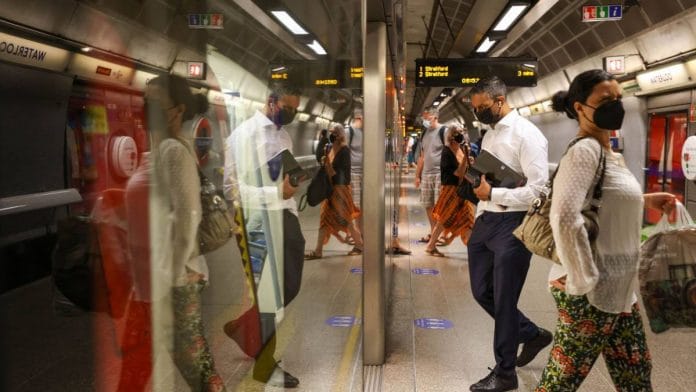New Delhi: The Covid-19 pandemic continues to worry the world with the total number of cases now over 20.4 crore and with more than 43.2 lakh deaths. So far, the virus has made its way to more than 200 countries and territories.
But there has been a fightback — a small Indonesian village has created a robot to help in Covid-struck areas. Meanwhile, the chief scientist of the Oxford Vaccine Group that created the Oxford-AstraZeneca jab, has criticised the UK’s Covid booster plan, calling it a panic move.
Indonesian village creates ‘Delta robot’ to assist self-isolating residents
A homemade robot designed by residents of Tembok Gede, a small Indonesian village, has helped deliver food and other amenities to self-isolating residents who have contracted Covid-19, reports Reuters.
Named ‘Delta Robot’, after the highly contagious variant, the robot has also helped in public services such as the spraying of disinfectants and making public announcements.
Made out of household items like pots, pans, and an old television monitor, the head of the robot has been fashioned out of a rice cooker.
Indonesia has so far registered 37,18,821 cases and 1,10,619 deaths.
Also read: Covid-19 pandemic: China reports highest spike since January, Florida now a hotspot
UAE makes Covid vaccination for 3-15-year-olds optional
The UAE’s Ministry of Health and Prevention has made Covid-19 vaccination for 3-15 year-olds optional, reports Khaleej Times.
The vaccine approved for 3-11-year-olds is the Chinese-made Sinopharm, while 12-15 year-olds can opt for either Sinopharm or Pfizer-BioNTech.
The announcement comes after the UAE conducted extensive clinical trials and evaluations. According to the report, UAE is the first country in West Asia to have conducted such studies.
“The ministry’s approval for the use of the Sinopharm vaccine for children between 3 and 17 years came after it was proven to be safe, based on the results of the clinical trials, the implementation of all medical protocols in place and according to the highest international standards and practices,” Hussain Abdul Rahman al Rand, assistant undersecretary for the public health sector, told Khaleej Times.
The UAE has registered 6,95,619 cases and 1,982 deaths.
Oxford scientist criticises UK’s Covid booster plan
As the UK government put plans in place to give its most vulnerable groups a third, or a booster Covid jab early next month, the head of the Oxford Vaccine Group has criticised the move saying the UK has no reason to panic right now, reports BBC.
Professor Sir Andrew Pollard, who led the team that created the Oxford-AstraZeneca vaccine, argued that vaccine doses need to “go where they can have the greatest impact” — to protect unvaccinated people abroad. He added that decisions on boosters “should be scientifically driven”.
Meanwhile, UK’s Health Secretary, Sajid Javid, who is waiting for final advice from the Joint Committee on Vaccination and Immunisation, is keen on going ahead with the booster plan fearing an uptick in cases in the upcoming flu season, said the report.
The UK has registered 61,17,540 cases and 1,30,503 deaths.
Around 5,000 students in Israel may contract Covid daily
According to Israel’s Education Ministry, an estimated 5,000 students may contract Covid-19 each day by the time the school year begins on 1 September, reports Haaretz.
An education ministry source told the paper that officials predict 10,000 new cases a day nationwide in September with about half of these being students. The ministry, however, has no plans to change the regulations for reopening schools.
On Sunday, Prime Minister Naftali Bennett approved a plan for reopening schools in September. According to the plan, if exposed to a person infected with Covid-19, teachers and students who have not been vaccinated or recovered will be given rapid antigen tests daily for a week.
Israel has registered 9,10,569 cases and 6,571 deaths.
What else are we reading:
What to Know About Breakthrough Infections and the Delta: The New York Times
The world is watching as China’s Delta outbreak hits an already vulnerable economy: The Age
(Edited by Paramita Ghosh)
Also read: Survey shows two-thirds of people around the world want to work from home after Covid-19






